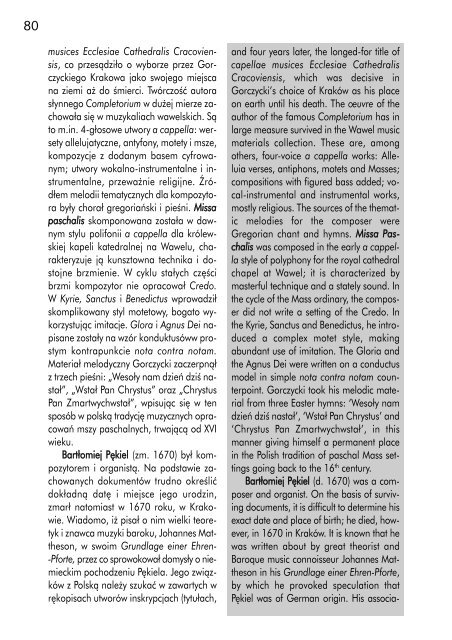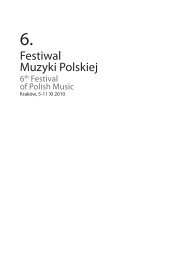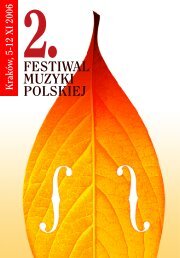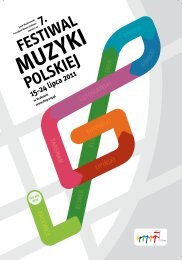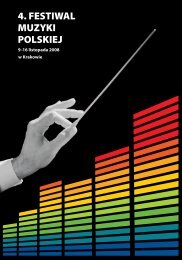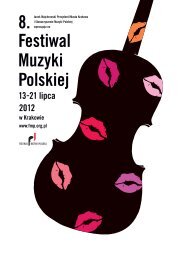You also want an ePaper? Increase the reach of your titles
YUMPU automatically turns print PDFs into web optimized ePapers that Google loves.
80<br />
musices Ecclesiae Cathedralis Cracoviensis,<br />
co przesądziło o wyborze przez Gorczyckiego<br />
Krakowa jako swojego miejsca<br />
na ziemi aż do śmierci. Twórczość autora<br />
słynnego Completorium w dużej mierze zachowała<br />
się w muzykaliach wawelskich. Są<br />
to m.in. 4-głosowe utwory a cappella: wersety<br />
allelujatyczne, antyfony, motety i msze,<br />
kompozycje z dodanym basem cyfrowanym;<br />
utwory wokalno-instrumentalne i instrumentalne,<br />
przeważnie religijne. Źródłem<br />
melodii tematycznych dla kompozytora<br />
były chorał gregoriański i pieśni. Missa<br />
paschalis skomponowana została w dawnym<br />
stylu polifonii a cappella dla królewskiej<br />
kapeli katedralnej na Wawelu, charakteryzuje<br />
ją kunsztowna technika i dostojne<br />
brzmienie. W cyklu stałych części<br />
brzmi kompozytor nie opracował Credo.<br />
W Kyrie, Sanctus i Benedictus wprowadził<br />
skomplikowany styl motetowy, bogato wykorzystując<br />
imitacje. Glora i Agnus Dei napisane<br />
zostały na wzór konduktusóww prostym<br />
kontrapunkcie nota contra notam.<br />
Materiał melodyczny Gorczycki zaczerpnął<br />
z trzech pieśni: „Wesoły nam dzień dziś nastał”,<br />
„Wstał Pan Chrystus” oraz „Chrystus<br />
Pan Zmartwychwstał”, wpisując się w ten<br />
sposób w polską tradycję muzycznych opracowań<br />
mszy paschalnych, trwającą od XVI<br />
wieku.<br />
Bartłomiej Pękiel (zm. 1670) był kompozytorem<br />
i organistą. Na podstawie zachowanych<br />
dokumentów trudno określić<br />
dokładną datę i miejsce jego urodzin,<br />
zmarł natomiast w 1670 roku, w Krakowie.<br />
Wiadomo, iż pisał o nim wielki teoretyk<br />
i znawca muzyki baroku, Johannes Mattheson,<br />
w swoim Grundlage einer Ehren-<br />
-Pforte, przez co sprowokował domysły o niemieckim<br />
pochodzeniu Pękiela. Jego związków<br />
z Polską należy szukać w zawartych w<br />
rękopisach utworów inskrypcjach (tytułach,<br />
and four years later, the longed-for title of<br />
capellae musices Ecclesiae Cathedralis<br />
Cracoviensis, which was decisive in<br />
Gorczycki’s choice of Kraków as his place<br />
on earth until his death. The oeuvre of the<br />
author of the famous Completorium has in<br />
large measure survived in the Wawel music<br />
materials collection. These are, among<br />
others, four-voice a cappella works: Alleluia<br />
verses, antiphons, motets and Masses;<br />
compositions with figured bass added; vocal-instrumental<br />
and instrumental works,<br />
mostly religious. The sources of the thematic<br />
melodies for the composer were<br />
Gregorian chant and hymns. Missa Paschalis<br />
was composed in the early a cappella<br />
style of polyphony for the royal cathedral<br />
chapel at Wawel; it is characterized by<br />
masterful technique and a stately sound. In<br />
the cycle of the Mass ordinary, the composer<br />
did not write a setting of the Credo. In<br />
the Kyrie, Sanctus and Benedictus, he introduced<br />
a complex motet style, making<br />
abundant use of imitation. The Gloria and<br />
the Agnus Dei were written on a conductus<br />
model in simple nota contra notam counterpoint.<br />
Gorczycki took his melodic material<br />
from three Easter hymns: ‘Wesoły nam<br />
dzień dziś nastał’, ‘Wstał Pan Chrystus’ and<br />
‘Chrystus Pan Zmartwychwstał’, in this<br />
manner giving himself a permanent place<br />
in the Polish tradition of paschal Mass settings<br />
going back to the 16 th century.<br />
Bartłomiej Pękiel (d. 1670) was a composer<br />
and organist. On the basis of surviving<br />
documents, it is difficult to determine his<br />
exact date and place of birth; he died, however,<br />
in 1670 in Kraków. It is known that he<br />
was written about by great theorist and<br />
Baroque music connoisseur Johannes Mattheson<br />
in his Grundlage einer Ehren-Pforte,<br />
by which he provoked speculation that<br />
Pękiel was of German origin. His associa


